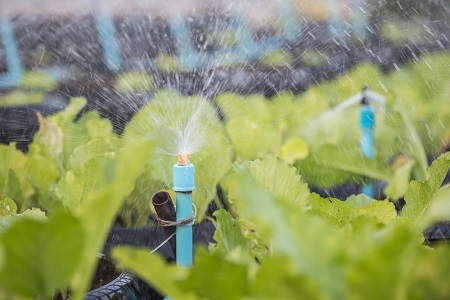How Drip Irrigation Can Revolutionize Your Landscape Maintenance
- Jun 14, 2023

There are various ways to water your garden – by using a hose, installing sprinklers, digging furrows, or simply using the good old watering can. Each option has its pros and cons and which one to use is a matter of personal preference and convenience. However, if you have a large yard and have landscaped it, then the time and effort that manual watering requires may not make much sense. Installing a water irrigation system is often the best solution. A drip irrigation system for the landscape may be the right choice. It is a high-tech way to irrigate the garden and ensures that it is done correctly.
Also Read: The Importance of Drought Resistant Landscaping
What Is Drip Irrigation?
The basic idea of drip irrigation is to have a water source that has a mechanical water carriage and dispersal system connected to it. The system will disperse water slowly and evenly, by dripping, over the ground it covers. Drip irrigation ensures that only the amount of water that is required is given to the soil and because of this, water wastage is significantly reduced. There are 4 types of drip irrigation systems for landscapes.
Soaker Hoses
These are hoses with specially made perforations along the length. The hoses are placed alongside flower beds, hedges, shrub lines, lawns, vegetable patches, etc. Water flows down the hoses and slowly leaches out from the holes, providing a slow and constant source of water to the soil.
Drip Tape
These are lengths of thin-walled flat tubing that are placed in the same way as soaker hoses. However, the tapes are flat until they are filled with water after which tiny amounts of water will seep through minute holes in the tape into the soil. Unlike soaker hoses, the tapes can be easily rolled up and stored away until they need to be used again.
Emitter Systems
This is a system that uses hoses that are raised on small supports so that they run over the surface. Small nozzles, called emitters, allow controlled amounts of water to drip to the ground.
Micro-Misting Systems
Similar to regular garden sprinklers, these are also attached to a hose or other water source. The micro-misters spray a very fine mist of water into the air which then slowly and evenly settles onto the ground and is absorbed by it. These are especially useful on sloping ground where other drip irrigation systems lose their efficiency.
Also Read: Embrace Your Community: Top Reasons to Choose a Local Landscaping Service
If the idea of installing a drip irrigation system for your landscape appeals to you, the first step is to consult local landscaping services for guidance on how to proceed. The climate, soil condition, types of plants to be irrigated and other considerations will govern the choice of system. A landscaping professional will have the specialized knowledge to advise you on the options available and will explain the various pros and cons of each so that you can make an informed decision on how to proceed. Once you decide, the landscaping company will be able to procure and install the system for you in a way that ensures many years of hassle-free operation. The amount of time that you save by using a drip irrigation system can then be spent enjoying your lush, well-watered landscape.















